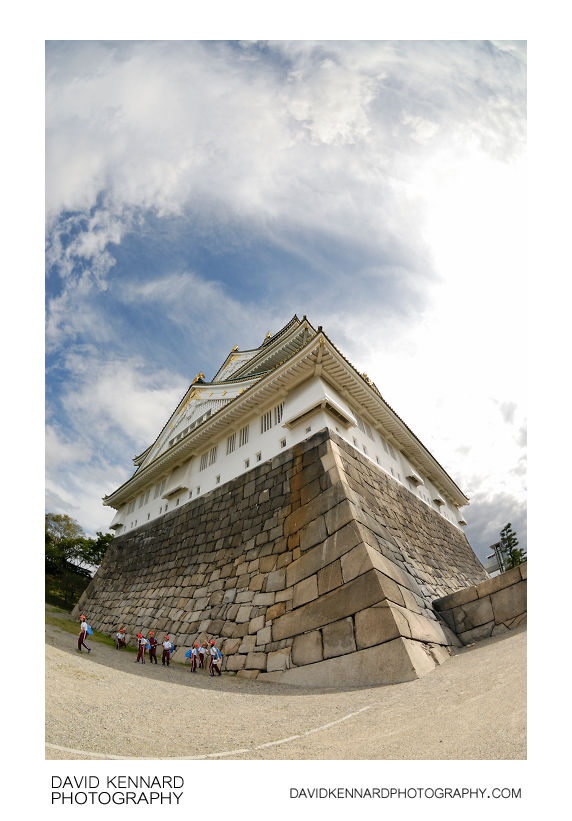Tenshukaku, Osaka Castle

Description
- Title:
- Tenshukaku, Osaka Castle
- Caption / Description:
-
The large stone wall base of Osaka Castle's tower / donjon (天守閣; Tenshukaku), in Osaka, Japan. The stone wall, called Ishigaki (石垣) in Japanese, was made from blocks of interlocking stone, with no mortar. Many of the stones used in the castle's construction were brought here from quarries near the Seto Inland Sea, over 100km away.
Osaka Castle (大坂城; 大阪城; Ōsaka-jō) was originally constructed in 1583 by Toyotomi Hideyoshi on the previous site of Ishiyama Hongan-ji, which was destroyed by Toyotomi's predecessor Oda Nobunaga in 1580. The castle included a eight storey main tower with three storeys below ground and five above. The outside of Tenshukaku was decorated with designs covered in gold leaf to impress visitors to the castle, and was completed in 1585.
In 1614 the castle was attacked by Tokugawa Ieyasu, who had the outer moat filled in. Later in 1615 Tokugawa returned and took the castle, and the tower was destroyed. His heir, Tokugawa Hidetada, then began to rebuild the castle in 1620, with construction of the new Tenshukaku completed in 1626.
In 1665 the tower was again destroyed when it burnt down after being struck by lightning. The tower was then not rebuilt until 1931 after the mayor of Osaka managed raise enough donations for the project. This third Tenshukaku was built using modern construction methods, and the inside of the tower is quite different to how it would have been previously.
The tower was renovated in 1997, and today houses a museum with a viewing platform near the top.
- Tags / Keywords:
-
- Asia
- Japan
- 日本国
- Nihon-koku
- Kansai region
- 関西地方
- Kansai-chihō
- Osaka prefecture
- 大阪府
- Ōsaka-fu
- Osaka city
- 大阪市
- Ōsaka-shi
- Kinki region
- 近畿地方
- Kinki-chihō
- Chuo-ku
- 中央区
- Osaka Castle
- 大坂城
- 大阪城
- Ōsaka-jō
- Donjon
- Castle tower
- Castle keep
- 天守閣
- Tenshukaku
- Stone wall
- 石垣
- Ishigaki
Admin
- Date Original Photo Taken:
- Original File Name:
- Tenshukaku castle tower north-west corner.psd
- Event:
- Rating:
- ☆
- Date this image added/last updated on website:
- Original File Dimensions:
- 2583px x 3862px
- File Type:
- JPEG
- Color Mode:
- RGB
- Original Image Color Profile:
- Nikon Adobe RGB 4.0.0.3001
Location
- Location Shown:
-
- Sublocation:
- Osaka Castle
- City:
- Osaka
- Province/State:
- Osaka prefecture
- Country:
- Japan
- World Region:
- Asia
- Location Created:
-
- Sublocation:
- Osaka Castle
- City:
- Osaka
- Province/State:
- Osaka prefecture
- Country:
- Japan
- World Region:
- Asia
- Geo-location:
- 34.687671666667, 135.52568 View on map
Rights
- Copyright Status:
- Copyrighted
- Licensing Status:
- Rights Managed
- Available for Editorial Use:
- Yes
- Available for Commercial Use:
- No
- Copyright Notice:
- © 2009 Dave Kennard
Camera Data
- Date Digital Resource was created:
- Shutter speed:
- 1⁄250 s
- Aperture:
- f/8
- Camera Model:
- Nikon D200
- ISO:
- 100
- Exposure Compensation:
- 0
- Focal Length:
- 10mm
- Focal Length (35mm equiv.):
- 15mm
- Metering Mode:
- Multi-segment
- Flash:
- No Flash
- Exposure Mode:
- Auto
- White Balance:
- Manual
- Light Source:
- Cloudy
- Exposure Program:
- Aperture-priority AE
Additional shooting metadata
- Lens:
- Tokina ATX107 DX FishEye 10-17mm F3.5-4.5
- Filters used:
- Additional Optics used:
- Setup:
- Handheld, bracketed ±1EV
Post Processing
- Image Modified:
- Software used:
-
- Nikon Capture NX 2
- Adobe Photoshop CS5
- Post Processing:
NEFs converted with -0.3 exposure compensation in CNX2
EV0 and EV+1 images blended for exposure in PS CS5
Topaz Adjust 4 using Photo Pop preset selectively applied in PS CS5
